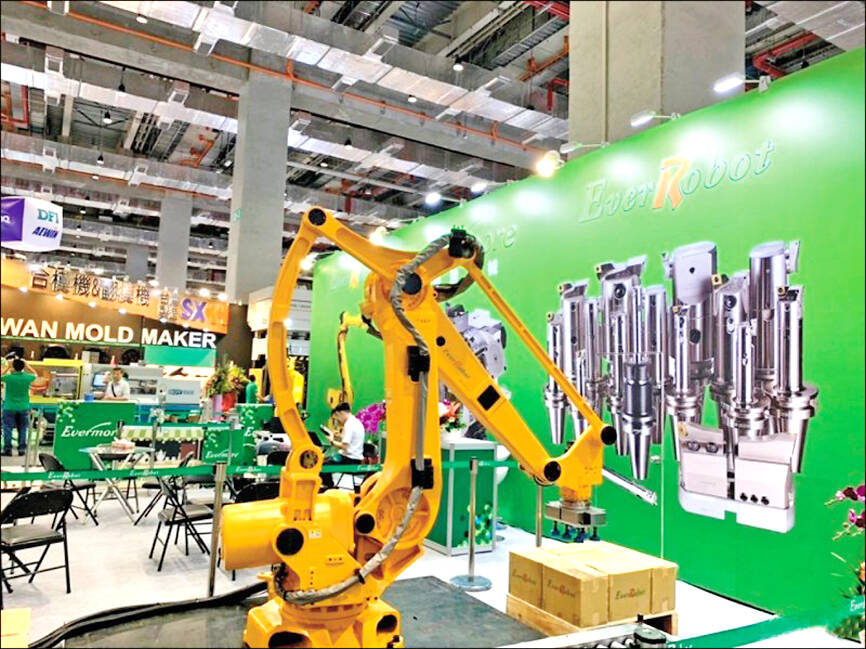The US’ 20 percent tariff on Taiwanese goods, on top of existing “most-favored nation” duties and other levies, could damage manufacturing and threaten jobs, Taiwanese industry and labor groups said on Saturday, urging the government to introduce subsidies and implement policies to help workers and ease pressures on companies.
Although described by the government as “temporary,” US President Donald Trump’s new tariff rate went into effect on Thursday, adding to existing most-favored nation duties and anti-dumping or countervailing tariffs.
The additional 20 percent — higher than the 15 percent rate for Japan and South Korea — has sent shock waves through the manufacturing sector, with reports of factories in industrial parks being put up for sale.

Photo: Lin Jing-hua, Taipei Times
The Taipei-headquartered Chinese Federation of Labor (CFL) said the “cumulative tariffs” are expected to hit companies involved in machine tools, machinery, screws, bicycles, textiles, and information and communications technology especially hard.
Although the industries account for only 20 percent of exports, they support 80 percent of Taiwan’s workforce, it said.
The increases could trigger mass unemployment, it said, calling on the government to negotiate with the US to lower the rates.
Cumulative tariffs and fluctuations in the New Taiwan dollar have eroded the price competitiveness of Taiwanese goods, it said.
“Although prices remain about 10 percent lower than Japanese products, Taiwan struggles to compete on brand and quality,” leading to continued losses in orders, the organization said, adding that Taiwanese goods are now more expensive South Korean products.
The CFL urged the government to adopt countermeasures to prevent large-scale relocations overseas, warning that such a shift could trigger a major unemployment crisis.
The group also proposed that the government introduce subsidies and transition support for affected workers, ease labor and health insurance requirements, simplify applications for unemployment and unpaid leave benefits, and implement policies to stabilize exchange rates to ease export cost pressures and reduce foreign exchange losses.
The Chinese National Association of Industry and Commerce said the government should quickly clarify how the US tariffs are calculated.
It recommended holding explanatory sessions, publishing a comprehensive list of affected products, establishing a dedicated contact center and streamlining subsidy applications to help industries plan.
The Taiwan Machine Tool and Accessory Builders’ Association said the additional tariff on top of the most-favored nation levy would significantly affect the machine tool industry.
The government needs to clarify product classifications, help businesses secure preferential tariff treatment and propose response measures during the transition period, it said.
A United Daily News report cited Kuo Ai-mei (郭璦玫), chairperson of the Taiping Industrial Park Manufacturers’ Association in Taichung, as saying that in the US machine tool market, Taiwan’s main competitors are Japan and South Korea, both of which have free-trade agreements with Washington, meaning they previously enjoyed zero tariffs.
“Adding the original tariff rate of 4.5 percent brings Taiwan’s total tariff rate to 24.5 percent,” which is nearly 10 percent more than that of Japan and South Korea, Kuo said.
The NT dollar’s exchange rate against the US dollar also affects the price competitiveness of exporters worldwide, she added.
In particular, over the past few months, the NT dollar has appreciated by about 13 percent, which is highly unfavorable for exporters, as it squeezes profit margins, she said.

Taiwanese scientists have engineered plants that can capture about 50 percent more carbon dioxide and produce more than twice as many seeds as unmodified plants, a breakthrough they hope could one day help mitigate global warming and grow more food staples such as rice. If applied to major food crops, the new system could cut carbon emissions and raise yields “without additional equipment or labor costs,” Academia Sinica researcher and lead author the study Lu Kuan-jen (呂冠箴) said. Academia Sinica president James Liao (廖俊智) said that as humans emit 9.6 billion tonnes of carbon dioxide compared with the 220 billion tonnes absorbed

The Taipei Mass Rapid Transit (MRT) Wanda-Zhonghe Line is 81.7 percent complete, with public opening targeted for the end of 2027, New Taipei City Mayor Hou You-yi (侯友宜) said today. Surrounding roads are to be open to the public by the end of next year, Hou said during an inspection of construction progress. The 9.5km line, featuring nine underground stations and one depot, is expected to connect Chiang Kai-shek Memorial Hall Station to Chukuang Station in New Taipei City’s Jhonghe District (中和). All 18 tunnels for the line are complete, while the main structures of the stations and depot are mostly finished, he

Taipei is to implement widespread road closures around Taipei 101 on Friday to make way for large crowds during the Double Ten National Day celebration, the Taipei Department of Transportation said. A four-minute fireworks display is to be launched from the skyscraper, along with a performance by 500 drones flying in formation above the nearby Nanshan A21 site, starting at 10pm. Vehicle restrictions would occur in phases, they said. From 5pm to 9pm, inner lanes of Songshou Road between Taipei City Hall and Taipei 101 are to be closed, with only the outer lanes remaining open. Between 9pm and 9:40pm, the section is

China’s plan to deploy a new hypersonic ballistic missile at a Chinese People’s Liberation Army Rocket Force (PLARF) base near Taiwan likely targets US airbases and ships in the western Pacific, but it would also present new threats to Taiwan, defense experts said. The New York Times — citing a US Department of Defense report from last year on China’s military power — on Monday reported in an article titled “The missiles threatening Taiwan” that China has stockpiled 3,500 missiles, 1.5 times more than four years earlier. Although it is unclear how many of those missiles were targeting Taiwan, the newspaper reported